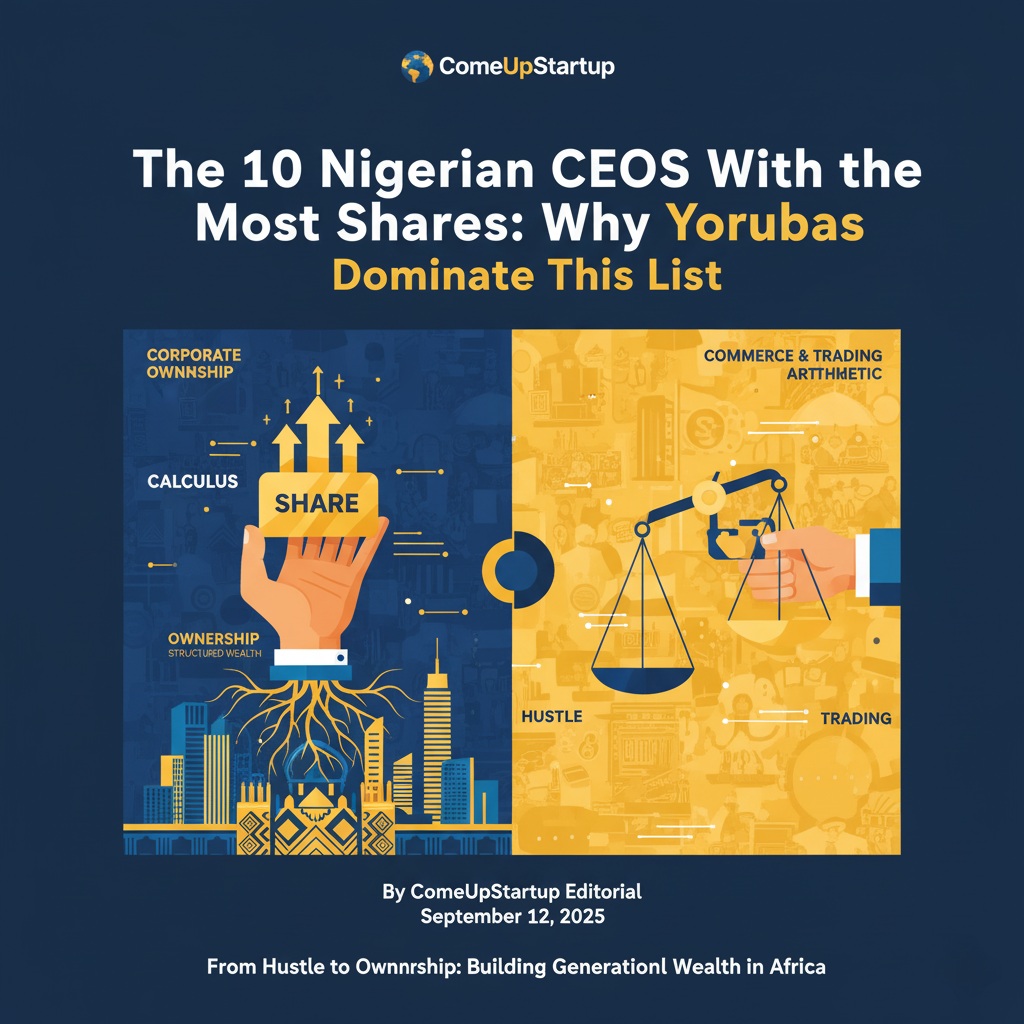The 10 Nigerian CEOs With the Most Shares: Why Yorubas Dominate This List
Recently, Nairametrics released a ranking of the top Nigerian CEOs who own the most shares in the companies they lead. From Wole Oshin of Custodian Investment Plc (63 billion shares) to Peter Ashade of United Capital Plc (50.9 million shares), the list reveals something fascinating: a majority of these names are Yoruba business leaders.
This has triggered a heated debate online, especially around the cultural differences in how Nigerians approach business, wealth, and ownership.
The List at a Glance

Image Credit: Nairametrics
- Wole Oshin (Custodian Investment Plc) – 63 billion shares
- Eddie Efekoha (Consolidated Hallmark Plc) – 1.62 billion shares
- Folasope Aiyesimoju (UAC of Nigeria Plc) – 130.72 million shares
- Ladi Balogun (FCMB Group Plc) – 648.38 million shares
- Yemi Odubiyi (Sterling Financial Holdings) – 707.96 million shares
- Babatunde Fajemirokun (AIICO Insurance Plc) – 147.11 million shares
- Oliver Alawuba (UBA Plc) – 111 million shares
- Nneka Onyeali-Ikpe (Fidelity Bank Plc) – 94.64 million shares
- Adaora Umeoji (Zenith Bank Plc) – 91.9 million shares
- Peter Ashade (United Capital Plc) – 50.9 million shares
Business vs. Trading: Arithmetic vs. Calculus
As one online commenter put it:
“There is a difference between business and trading. It’s like arithmetic vs calculus. Trading is basic arithmetic—buying and selling, stacking margins. Business ownership through shares, capital, and finance is calculus—complex, structured, and long-term. Not everyone is wired for it.”
This perspective highlights an important truth: trading builds income, but ownership builds wealth. While many Igbos have built generational wealth through commerce and trading, Yoruba CEOs appear more visible in structured corporate ownership models like banking, insurance, and investment.
Different Styles of Entrepreneurship
Another comment framed it this way:
- Yorubas are entrepreneurs. They are “snipers”—strategic, precise, and willing to wait for the right opportunity before pulling the trigger.
- Igbos are businessmen. They are “machine guns”—fast-moving, aggressive, shooting in all directions until they hit their target.
Both approaches work, but they produce different outcomes: one builds formal, institutional wealth visible on the Nigerian Stock Exchange; the other builds private, often family-run enterprises that may not show up on such lists.
Lessons for Young Entrepreneurs
- Think Ownership, Not Just Hustle: Beyond running a shop or a hustle, start thinking in terms of equity, shares, and scalable business models.
- Visibility Matters: Listed companies force transparency. They’re audited, reported on, and valued. If your business never formalizes, it risks dying with you.
- Complement Styles: Nigeria doesn’t need one model over the other. Trading creates wealth circulation. Corporate ownership secures long-term capital growth. Smart founders can merge both worlds.
Final Thought
This list isn’t a competition between Igbos and Yorubas. Instead, it’s a reminder of the many ways Nigerians create wealth. But the conversation reveals one thing clearly: real power lies in ownership.
Whether you’re trading in Onitsha, coding in Yaba, or running a fintech in Lagos, the future belongs to those who move from arithmetic to calculus—from hustle to ownership.
👉 Question to our readers: Do you think cultural background plays a big role in how Nigerians build wealth, or is it more about education and exposure?




Leave a Reply